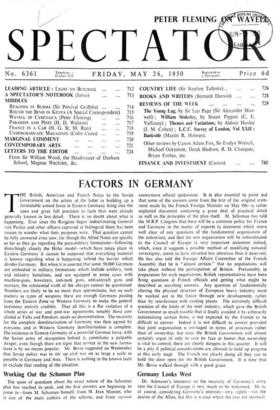Working Out the Schuman Plan
The spate of questions about the exact nature of the Schuman plan has reached its peak, and the first answers are beginning to come in—from M. Schuman himself, from M. Jean Monnet, who is one of the main authors of the scheme, and from various anonymous official spokesmen. It is also essential to point out that some of the answers come from the text of the original state- ment made by the French Foreign Minister on May 9th—a rather neglected document containing a great deal of practical detail as well as the principles of the plan itself. M. Schuman has told the M.R.P. Congress that there will be a common policy for France and Germany in the matter of exports (a statement which steers well clear of any questions of the fundamental organisation of the industries), and that the new organisation will be subordinated to the Council of Europe (a very important statement indeed, which, since it suggests a possible method of modifying national sovereignty, seems to have attracted less attention than it deserves). He has also told the Foreign Affairs Committee of the French Assembly that he is " almost certain " that no negotiations will take place without the participation of Britain. Presumably in preparation for such negotiations, British representatives have been firing questions at French officials and getting what might be described as searching answers. Any question of fundamentally altering the physical structure of European heavy industry must be worked out in the future through new development, rather than by interference with existing plants. The extremely difficult question of the limits of the steel industry, which gave the British Government so much trouble that it finally avoided it by arbitrarily nationalising certain firms, is not expected by the French to be difficult to answer. Indeed it is not difficult to answer' provided that joint organisation is envisaged in terms of processes rather than of ownership, but since the British Government will almost certainly argue (if only to save its face at home) that ownership is vital to control, there are clearly dangers in this quarter. It will be a pity if political considerations are allowed to hold up progress at this early stage. The French are clearly doing all they can to hold the door open for the British GoVel:nment. It is time that Mr. Bevin walked through with a good grace.






































